Resveratrol is a powerful antioxidant and anti-inflammatory that can be used to improve your heart health, protect your body against cancer, fight inflammation, and prevent cognitive decline.
It’s most well-known for being found in red wine and other red grape products, but it’s produced in small quantities by many different types of plants to fight off bacterial and fungal infections.
A concentrated form of this compound, taken in a supplement, is an easy way to take advantage of the antioxidant properties of resveratrol. Our researchers have ranked the ten most effective resveratrol supplements on the market.
Research
Rankings
1. Resveratrol Rapid + by Nuzena
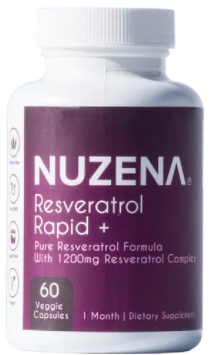
For those who are serious about getting the best resveratrol supplement on the market, Resveratrol Rapid + is at the top of the charts.
Resveratrol, a plant based compound that works as an antioxidant. It is found commonly in grapes, some berries and peanuts. Red wine has a high concentration of Resveratrol because of the fermentation process.
Resveratrol is suggested to aid in lowering of blood pressure. Occurring with age, high blood pressure is a factor that leads to heart disease. Resveratrol is said to increase the production of nitric oxide which relaxes the blood vessels.
Nuzena’s Resveratrol Rapid + has a dosage of 1200mg, which outperforms its competitors. On top of a high dosage, what we like is that Nuzena have a reputation for quality. Offering quality certification, formula’s that are Non – GMO, Gluten Free and Vegan friendly and products produced in FDA registered facilities. An impressive list…
Overall, Resveratrol Rapid + by Nuzena is our #1 resveratrol supplement of 2021.
2. aSquared Nutrition Resveratrol Maximum Strength
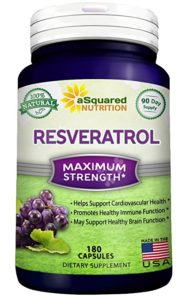
aSquared Nutrition takes a super-pure approach to their resveratrol supplement. With 500 mg of pure resveratrol from the Japanese knotweed plant as its source of active compounds, the only other ingredients included are gelatin for the capsule and rice flour.
It’s an excellent pick if you want resveratrol exclusively, without any additives or additional antioxidants.
3. Toniiq Resveratrol
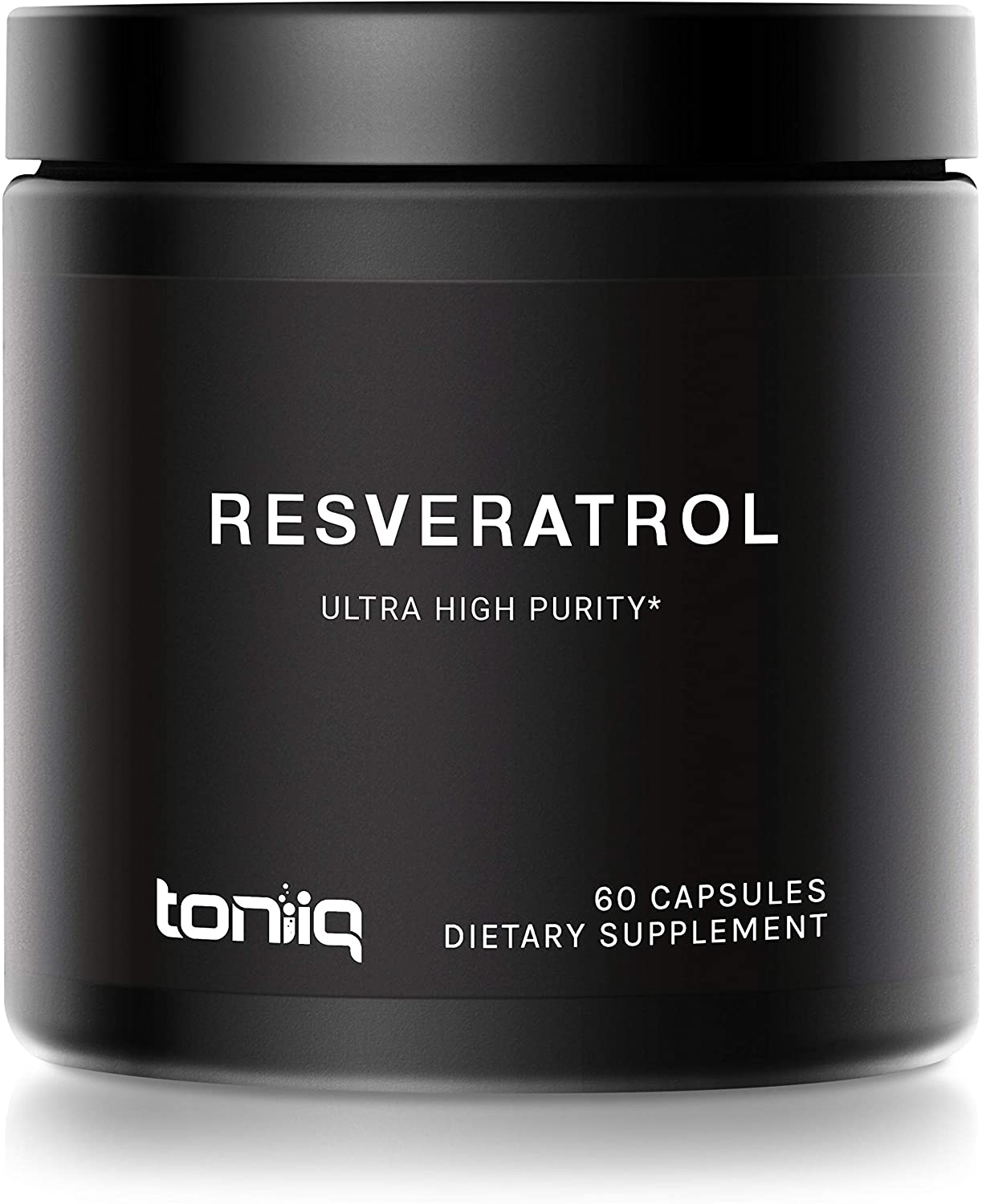
Toniiq uses an extra purification step to concentrate the amount of resveratrol in this supplement. Though it only provides 300 mg of material per capsule, it’s at least 98% resveratrol, on average double what you’ll get in the competition. The only reason it misses out on the top few spots are the presence of a few extra binders and stabilizers. If you don’t care about these, it’s still an excellent pick.
4. PURELY Beneficial Resveratrol 1450
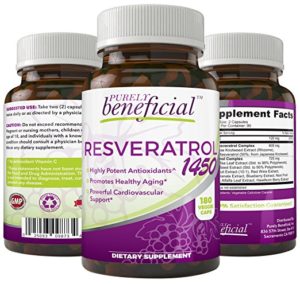
PURELY Beneficial has a resveratrol supplement that uses Japanese knotweed as its primary resveratrol source.
However, in addition to the resveratrol, there is a polyphenol complex from green tea extract, grape seeds, acai, and other strong antioxidant compounds.
On top of that, there’s 200% of your recommended daily intake of vitamin C. This makes it a strong all-around antioxidant, with plenty of resveratrol.
You can consider it a “maximalist” approach, since it’s got so many supporting antioxidants in addition to its main ingredient, resveratrol.
5. NOW Natural Resveratrol
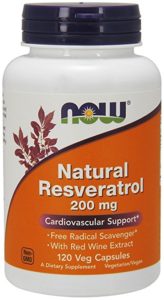
NOW Natural Resveratrol uses Japanese knotweed as its primary source of resveratrol, but it also includes red wine extract (which is alcohol-free) so that resveratrol is present alongside the supporting polyphenol compounds that occur alongside it in red wine.
Each capsule has 200 mg of pure resveratrol, making this a very good source for a standardized dosage if you are trying to follow the protocols of clinical studies.
6. Garden of Life Raw Resveratrol
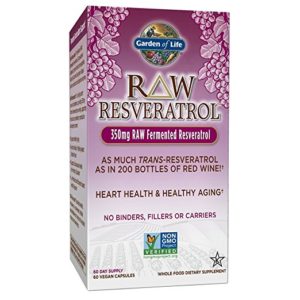
Garden of Life Raw Resveratrol delivers a strong 350 mg dose of resveratrol, derived both from Japanese knotweed and from red wine grapes.
As is always the case with Garden of Life supplements, the active ingredient is accompanied by a suite of organic antioxidants, including apple beet, broccoli, bell pepper, and brussels sprouts, to include just a few.
If you want your resveratrol alongside as many other antioxidants as possible this supplement is the way to go.
7. Reserveage Nutrition Resveratrol
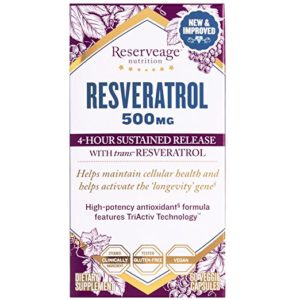
Reserveage Nutrition Resveratrol is crafted to deliver a very high dose of resveratrol (500 mg), and while the resveratrol itself is derived from Japanese knotweed, Reserveage Nutrition goes out of its way to ensure that extracts from red wine grapes are also present.
You can get the benefits from the other biologically active phytonutrients that accompany resveratrol in red wine.
8. Life Extension Optimized Resveratrol
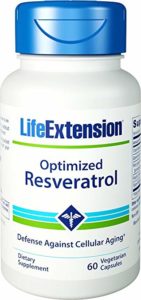
Life Extension Optimized Resveratrol is another blended resveratrol supplement that also includes the antioxidants quercetin, red grape extract, and other sources of natural antioxidants.
The resveratrol dosage is quite solid, at 250 mg of pure resveratrol per capsule, so if you want a higher dose of resveratrol, but still want other antioxidants alongside, it’s a good pick.
9. Purest Vantage Trans-Resveratrol
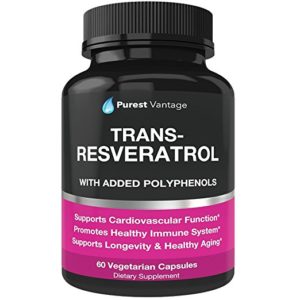
Purest Vantage Trans-Resveratrol is another supplement that provides resveratrol alongside other popular antioxidants like green tea extract grape seed extract, acai fruit, and quercetin.
The resveratrol content is pretty solid, at 300 mg per capsule, though the actual number of pills per bottle (only 60) will be a problem if you are planning on taking this supplement for an extended period of time.
10. Jarrow Formulas Resveratrol
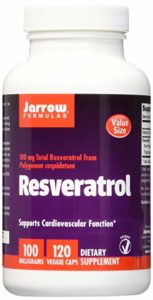
Jarrow Formulas Resveratrol is pretty simple; it provides a lower dose of 100 mg of pure resveratrol per capsule, matched 1:1 with 100 mg of vitamin C for greater antioxidant abilities.
It’s not the most pure, nor is it the most comprehensive when it comes to additional antioxidants, but it will have a niche use for people who want a smaller dosage (or a normal dosage spread throughout the day via several capsules).
11. BRI Nutrition Resveratrol Extra Strength
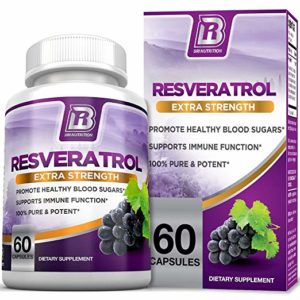
BRI Nutrition Resveratrol Extra Strength uses a blend of different antioxidants, including resveratrol but also pomegranate, green tea, quercetin, and other popular antioxidants.
Unfortunately, these are all components in a proprietary blend, so it’s not possible to tell how much resveratrol itself is present in the supplement.
Category winners
Best resveratrol overall: Resveratrol Rapid + by Nuzena
Nuzena takes our top overall spot thanks to its super-potent and ultra-pure formulation. With an industry-leading 600 mg of resveratrol per capsule, Resveratrol Rapid + is tough to beat.
Best resveratrol for heart health: Resveratrol Rapid + by Nuzena
The heart health benefits of resveratrol are thought to be linked to its powerful antioxidant capabilities, so to take maximum advantage of these, we recommend the high-dose resveratrol supplement made by Nuzena if you’re looking for a resveratrol supplement for cardiovascular health.
Best resveratrol for skin: aSquared Nutrition Resveratrol Maximum Strength
Just looking for a resveratrol supplement to keep your skin feeling healthy and young? If so, aSquared Nutrition, which has a more moderate dosage, is the way to go. The dosage is solid, and from a supplement design perspective, it’s great—it’s not bloated with extraneous ingredients or stabilizers.
Best resveratrol for older adults: Resveratrol Rapid + by Nuzena
Older adults will be particularly interested in the high dosage, high purity resveratrol in Resveratrol Rapid + by Nuzena—with the equivalent amount of resveratrol of over 200 bottles of red wine, it’s far and away the best on the market when it comes to antioxidant content.
Best resveratrol for inflammation: PURELY Beneficial Resveratrol 1450
If you want to use resveratrol to fight inflammation, PURELY Beneficial Resveratrol 1450 is our recommendation due to its pairing of resveratrol with other powerful antioxidants, like green tea leaf extract and grape seed extract. These potent antioxidants can work together to fight inflammation in your body.
Best resveratrol for cognitive function: Resveratrol Rapid + by Nuzena
Like with heart health, when it comes to leveraging the potential cognitive benefits of resveratrol, a higher dose is best. That’s why we recommend Nuzena’s Resveratrol Rapid + for people interested in using resveratrol to preserve brain function as they get older.
Who should buy resveratrol?
Resveratrol is safe for most individuals and is great for reducing the risk of heart disease and cancer. It can also support healthy aging and prevent cognitive decline in older adults.
Special populations such as diabetics and pregnant women should proceed cautiously before taking a resveratrol supplement. If you are taking a blood-thinning medication, you should speak to your doctor before taking resveratrol as there may be some interaction. People who have recently undergone surgery or are going to have surgery in the near term should also avoid taking resveratrol.
Because resveratrol can have slight estrogenic effects in the body, people with estrogen sensitivity issues should avoid it until more conclusive research is available.
How we ranked
Clinically effective doses of resveratrol range from 100mg to 500mg, with some research showing benefits of up to 5000mg per day. As such, we ranked higher dosing products like aSquared Nutrition, and We Like Vitamins well for making it easier to hit the higher end of the dosage range. Proprietary blends, like BRI nutrition, were ranked poorly as we were unable to determine
Purity was also an important factor to consider. We required our top products to be non-GMO and produced in an FDA certified facility. Bonus points went to products that were vegan and gluten-friendly.
Lastly, we looked at the supporting ingredients. There are various beneficial compounds that can be included in a standard resveratrol supplement that help to boost the overall antioxidant power, including vitamin C, green tea extract, and acai. Garden of Life and Purely Beneficial made our list as a result.
Products like Now were also rewarded for providing even more unique ingredients like red wine extract that improved the polyphenol profile. Our top pick, Nuzena, was rewarded for providing a pure resveratrol product at a high dose, with minimal fillers and additives.
Benefits
Resveratrol can decrease risk factors for heart disease. One of the largest areas of benefit of resveratrol is in improving heart health.
Resveratrol has been connected with a number of improvements in biomarkers that are directly linked to your risk of developing cardiovascular disease.
According to one review published in the journal Cardiovascular Drug Reviews by three researchers in Italy, these benefits include a reduction in platelet aggregation, lower rates of LDL cholesterol oxidation, and improvements in the function of the cells that make up your blood vessels and arteries (1).
While the early studies on resveratrol and heart disease were based on studies on tissue cultures or animal models, there is now direct clinical evidence from research in humans that resveratrol improves biomarkers linked to cardiovascular disease.
A study published in 2012 in the journal Clinical hemorheology and Microcirculation by researchers in Hungary described a double-blind placebo-controlled trial of resveratrol among a group of people with diagnosed cardiovascular disease (2).
The trial involved 40 patients who had survived a heart attack. Half the patients received a resveratrol supplement daily, while the other half received a placebo.
After three months, the researchers found that the patients taking resveratrol had better ventricle function and lower LDL cholesterol compared to the placebo group.
Resveratrol has been studied as a preventative agent against cancer. Due to the powerful antioxidant effects of resveratrol, it’s attracted much attention for the possibility of using it to prevent cancer.
There’s a strong correlation between increased fruit and vegetable intake and decreased rates of cancer, and antioxidants like resveratrol that are found in these foods are a leading hypothesis for why (3).
Resveratrol in particular has attracted attention thanks to a raft of studies in the last few decades drawing attention to its ability to target specific cellular signalling pathways needed for cancer to initiate.
One landmark paper published in the prestigious journal Science detailed the ability of resveratrol to block the development of precancerous growths in mice (4).
This inspired a slew of follow-up research, which has turned into clinical trials in humans that are ongoing.
A review published in 2015 by researchers at the University of Wisconsin details some of the challenges that researchers continue to grapple with as they strive to move towards using resveratrol in clinical practice (5). Solid data is still forthcoming, but resveratrol shows a lot of promise when it comes to preventing cancer, and it could end up being a mainstay in cancer prevention in the future if ongoing research turns out well.
Resveratrol may help preserve cognitive function as you get older. While heart disease and cancer are the two most lethal forms of disease, Alzheimer’s disease—a form of progressive cognitive decline—comes in at number six (6).
Emerging evidence suggests that resveratrol could protect your brain as well as your body from the ravages of aging. One study in mice, published in the journal Frontiers in Aging Neuroscience, used a mouse model to show that resveratrol can preserve cognitive function in aging (7).
The researchers showed that aging mice given resveratrol performed better in a maze puzzle than control mice, and moreover, the resveratrol was associated with a decrease in abnormal changes in the brain.
Research in humans published in 2010 in the American Journal of Clinical Nutrition showed that even a single dose of resveratrol can increase blood flow during a cognitive task (8). Additionally, this effect was dose-dependent: higher doses created greater amounts of blood flow.
Resveratrol can reduce systemic inflammation. In addition to the antioxidant benefits of resveratrol, many scientists think that the health benefits of this supplement may be attributable, in part, to its anti-inflammatory effects.
Other popular antioxidants, like green tea extract, show similar anti-inflammatory properties as well. Research published in the British Journal of Pharmacology demonstrated that resveratrol reduces systemic inflammation in rats with colitis (9).
There is even some research in rabbits suggesting that resveratrol could reduce inflammation-related damage in osteoarthritis (10).
Side effects
Resveratrol, being a naturally-occurring compound, appears to be tolerated quite well.
Animal studies attempting to establish levels of toxicity have use extremely high levels of resveratrol for weeks at a time (equivalent to a full-sized human consuming an entire bottle of resveratrol pills every day) with no apparent ill effects (11).
Studies in humans have used dose of up to 5000 mg at a single time with no apparent ill effects, though prolonged doses of 1000 mg or more for over a months have been associated with mild gastrointestinal effects like bloating and diarrhea.
Because resveratrol inhibits platelet aggregation (which is part of its benefit for heart disease), it could interact with prescription blood thinners like warfarin, so people on these kinds of prescription medications should talk to their doctor first before they use resveratrol.
Recommended dose
Clinical research into resveratrol has been all over the board with regards to dosage. Studies have explored daily doses ranging from 10 mg to 5000 mg, but there are no clear guidelines for optimal dosage yet (12).
There may not be one optimal dose―the right amount for heart health might be different than the right amount for the cognitive protection benefits.
The Linus Pauling Institute notes that doses as low as 10 mg have been beneficial, but most studies that have found benefits have used doses of 100 to 500 mg per day (13). It may be advantageous to spread this out over multiple doses throughout the day.
FAQ
Why did resveratrol get so popular? Resveratrol is a strong naturally occurring antioxidant that’s been connected to improvements in heart health, oxidative damage, and inflammation levels.
Resveratrol first rose to prominence because it occurs in red wine, which was connected with positive health outcomes in a number of large epidemiological studies.
Where does resveratrol naturally occur? Resveratrol is produced by many plants, from peanuts to Japanese knotweed, to fight off bacteria and fungi, and can be delivered in supplement form in high doses for optimal health benefits.
Will resveratrol break a fast? If you participate in intermittent fasting, resveratrol will not break your fast. In fact, it can have added benefits to your fast. Sirtuins are the genes that control the speed of aging. They respond to hunger and exercise and protect the body against disease and deterioration.
Fasting promotes an increase in certain sirtuins, and NMN and Resveratrol can stimulate them as well. David Sinclair, Ph.D., A.O., is a professor at Harvard Medical School in the Department of Genetics and suggests that resveratrol is needed to drive sirtuins (14).
Based on this, the benefits from intermittent fasting combined with NMN and resveratrol, will help you progress faster than you would without the combination.
Does resveratrol help with weight loss? Research suggests that resveratrol stimulates the SIRT1 sirtuin gene, which protects the body against obesity. Many supplements on the market claim that they promote weight loss, but many of these claims are not substantiated by research.
If you are looking to introduce a resveratrol supplement into your weight loss plans, please consult your doctor before taking them.
Does resveratrol lower blood pressure? There have been considerable links between resveratrol found in red wine and lowering blood pressure. Polyphenols, found in red wine, could also be beneficial for your cardiovascular health.
However, the relationship has primarily been seen in mice and has not been tested in human clinical trials. According to the American Heart Association, the results of these studies would be similar for humans because resveratrol would act similarly on a molecular level.
Will resveratrol keep me awake? Resveratrol is not necessarily used to promote awakeness, but instead, studies claim that it can help strengthen both the sleep and wake cycle. It’s suggested that resveratrol supplements help reduce chronic pain, boosts mood, and allows individuals to have a deeper sleep.
Ultimately it will enable individuals to feel more rested and awake during the day.
When should I take resveratrol? There is no specific time that is best to take resveratrol and can be taken on a full or empty stomach. There is some evidence to suggest that because it is fat-soluble, it may be best to be taken with a fatty meal.
If you are an athlete, taking resveratrol or other antioxidant supplements before a workout decreases insulin sensitivity.
Which type of wine has the most resveratrol content? Red wine has always had a reputation for being heart-healthy when consumed in moderation. Resveratrol is found in the skin of the grapes that are used to produce wine.
Because red wine requires more fermentation than white wine, there is a higher Resveratrol content in red wine.
How do I know if resveratrol is right for me? There are many claims surrounding resveratrol supplements, from aiding in weight loss to lowering blood pressure and helping to protect against certain cancers. If you have recently had surgery, you should not be taking resveratrol supplements as it can increase your chance of bleeding.
If you are not currently taking any other medications or supplements that resveratrol will interact with, you may consider taking this supplement. If you do not have a sensitivity to the naturally occurring resveratrol in foods, then you can consult your doctor for dosage details and if it’s right for you.
I’ve heard resveratrol can reverse the effects of aging, is that true? Resveratrol is commonly included in anti-aging supplements, and there are many claims suggesting it is beneficial to help prolong the effects of aging. However, there is not a lot of conclusive evidence and studies performed on humans to go in either direction.
If I have PCOS, should I be taking resveratrol? Women who struggle with PCOS tend to have an increased amount of testosterone and insulin in their bodies, which causes the symptoms associated with PCOS. While are many medications and lifestyle changes that can be adapted to treat the symptoms of PCOS, but there is no cure.
In a 2016 study by the Endocrine Society on the effects of Resveratrol and PCOS, 30 participants were given 1,500 mg of a Resveratrol supplement or a placebo every day for three months. The blood samples that were taken measured the levels of testosterone and DHEAS, as well as glucose tolerance tests for detecting diabetes.
The study showed that the women who received the supplement saw a 22% reduction in testosterone levels and a 22% reduction in their DHEAS levels. Their insulin levels improved significantly, including their fasting insulin levels, which dropped 32% during the study.
These results are very encouraging; however, this is just one study of a small sample size. If you want to introduce a resveratrol supplement to help with your PCOS symptoms, please consult your doctor before doing so. If you are currently on other medications to treat it, they may interact negatively with natural supplements.
Can resveratrol help with infertility? There are many claims that resveratrol has significant potential in helping women who have impeded ovarian function, infertility, PCOS, and endometriosis. Similarly to the study of women with PCOS, there has only been one small clinical trial on women who were undergoing in vitro fertilization, but the outcome was positive and leaves room for more research in the future.
Resveratrol stimulates the sirtuin gene SIRT1 in the ovaries, which can help protect the ovaries against the degeneration of the cells. It then activates telomerase activity and mitochondrial function, to ultimately increase ovarian function. In the endometrium, the CRABP2-RAR pathway is downregulated, which suppresses the aging of the cells, creating a better environment for embryo implantation and placentation.
These results are positive, and the potential for resveratrol to help with infertility is excellent. Still, more research needs to be conducted and reviewed before it is widely used as a treatment. If you are infertile and want to add a resveratrol supplement into your routine, you should consult a fertility specialist before doing so.
Is resveratrol going to help improve my memory, and is it ideal for Alzheimer’s patients? Evidence has suggested that resveratrol has both affected memory and little effect on preserving memory. Resveratrol may protect the brain against aging and disease because of the properties that protect our cells from degeneration.
When it comes to Alzheimer’s Disease, the evidence suggests that resveratrol could be a treatment to help improve cognitive ability and memory in late to middle age. Resveratrol promotes modulation of the plasticity in the hippocampus and suppresses low-level chronic inflammation in the brain. This information comes solely from studies on mice, which could lead the charge in human clinical trials.
Should I take resveratrol if I am taking other medications? You should avoid taking resveratrol if you take medications that thin the blood. If you regularly take ibuprofen or naproxen, resveratrol could increase your risk of bleeding. Blood pressure medication or medications that are processed by the liver should avoid being taken with resveratrol.
Drugs that slow blood clots will not interact well with resveratrol, as it also slows down blood clots. The best course of action is to ask your doctor if any of the medications you are taking could negatively interact with any supplements you’re introducing into your routine.
Should I take resveratrol if I am taking other supplements? Much like combining resveratrol with other medications, other supplements carry the same weight. There is not enough research to show which supplements can interact with resveratrol. Still, you should always consult your doctor or pharmacist when you want to take several natural supplements at the same time.
What is the best brand of resveratrol supplements on the market? Many top-selling brands offer resveratrol. To ensure you are getting a quality product, choose a brand that is well-known and has an excellent reputation for quality. Some of the top brands we’ve reviewed include Nuzena, Thorne Research and aSquared Nutrition.
Can I take resveratrol if I have diabetes? While the role of resveratrol on diabetes is complex, a critical review of a decade’s worth of case studies shows positive results (15).
In the near future, resveratrol could be used in conjunction with diabetes medication or as a stand-alone treatment. If you are interested in incorporating a resveratrol supplement into your diabetes treatment, please consult with your primary care physician first.
How will my body respond if I am allergic to resveratrol? If you are allergic to resveratrol, you may experience rash, nausea, vomiting, diarrhea, or other symptoms that vary from person to person.
Related Articles
Recap
Resveratrol is one of the most promising supplements for longevity and health. It may offer protective effects against some of the most common and most deadly chronic diseases: cancer, heart disease, and cognitive decline.
The evidence for resveratrol is still emerging, so we don’t yet know what the optimal dosage is, but beneficial effects have been found at the 100 to 500 mg per day dosage level.
As far as side effects, resveratrol appears to be very well-tolerated. Mild gastrointestinal symptoms are the only reported side effects, and it is not toxic even at very high doses.
The only exception is for people who take blood thinners like warfarin—they should talk to their doctor before taking resveratrol.
Among antioxidant supplements for improving your long-term health, resveratrol is one of the most promising options.
Its safety, efficacy, and the incredible amount of research into its possible benefit make a strong case for taking this supplement for long-term well-being.
For BodyNutrition’s #1 recommended resveratrol supplement, click here.